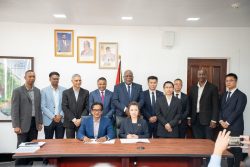Despite trumpeting its “massive victory” in Friday’s local government elections, the PPP/C suffered a stunning defeat in Georgetown that raises questions about the party’s strategy and leadership in the most important municipality.
The PPP/C only won two seats in the main prize, Georgetown, down from eight seats in 1994. The APNU+AFC coalition won 25 of the 30 seats that make up the Georgetown City Council while Team Legacy won two seats and Benschop for Mayor won one seat. It means that while holding 32 seats in parliament, the PPP/C’s influence on the council is now equivalent to that of Team Legacy which contested the polls for the first time. The poor showing in Georgetown will also be seen as a verdict on the former PPP/C’s handling of the capital city between 1992 and 2015. In a matter of months the APNU+AFC government has managed to transform large parts of the city including the long-suffering Kitty Market and the swathe of land along Homestretch Avenue.
In addition, the PPP/C did not win a single one of the 15 constituency seats in Georgetown although it attracted strong support from parts of the city at last year’s general election. One of the constituency seats was won by Team Legacy.
Of the other eight municipalities, the PPP/C has so far only managed to secure Anna Regina. Official results have not been issued for Rose Hall and Corriverton which it won in 1994 but there are reports that it has not done well there. Recounts have been sought by the PPP/C in Rose Hall. The APNU+AFC coalition took command of New Amsterdam and Linden as well as the new towns of Lethem and Bartica. There was no word yet on Mabaruma where the race was said to be close.
In Bartica, the PPP/C won three seats compared to 14 for APNU+AFC. The group, Bartica Independent Green Alliance won the remaining seat. In Linden, the PPP/C did not win a single seat while APNU+AFC took 15 seats. The remaining seat went to the group Linden 2025.
Although official results have not yet been released by the Guyana Elections Commission (GECOM) indications are that the PPP/C won the majority of Neighbourhood Democratic Councils (NDCs). However, the municipalities are seen as the bigger prizes as not only is the population greater in the towns but they would attract a greater amount of funding as well.
Friday’s polls were the first such since the last local government elections here in 1994. The elections were the first to be held under a new hybrid system of Proportional Representation (PR) and First-Past-The-Post (FPTP) with each voter being allowed to vote twice: once under the PR component and once under the FPTP component. Each system accounts for 50% of the seats available in each local government area.
Further, the number of municipalities being contested increased to nine from six. The original six were Georgetown, Linden, Anna Regina, New Amsterdam, Rose Hall and Corriverton while Bartica, Mabaruma, and Lethem are the new municipalities. 62 Neighbourhood Democratic Councils (NDCs) were also in play.
On Saturday, Chief Election Officer Keith Lowenfield said Guyana’s first local government elections in more than 20 years saw between 38% and 39% of registered voters casting ballots across the country. In the capital city, 41,924 of the 112,364 registered electors, some 37.3%, voted.
This is more than the 33.37% who turned up to cast their ballots in 1994, according to the Inter-national Foundation for Electoral Systems report. It is, however, less than the 55.6% of registered disciplined service members who turned up to vote on March 8.









